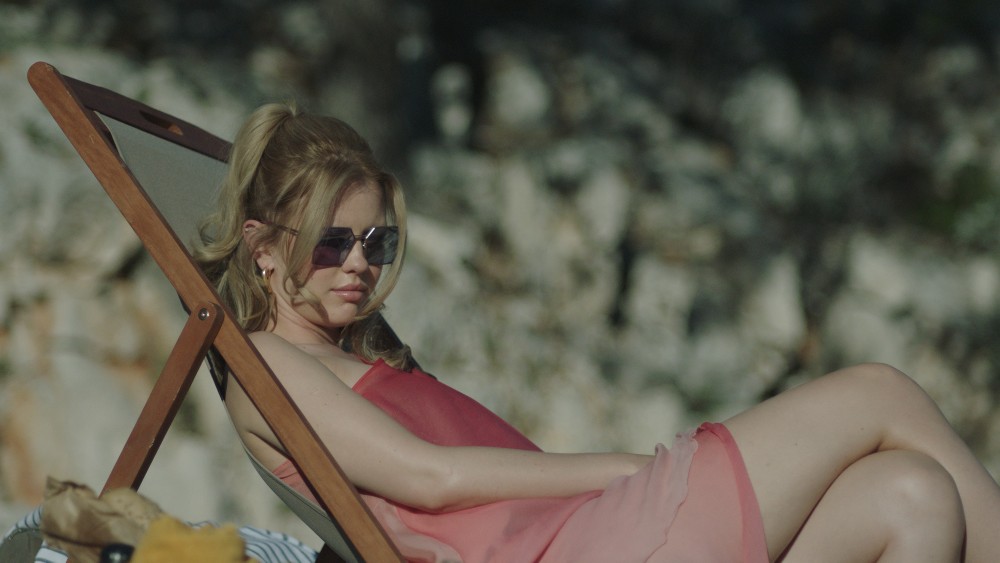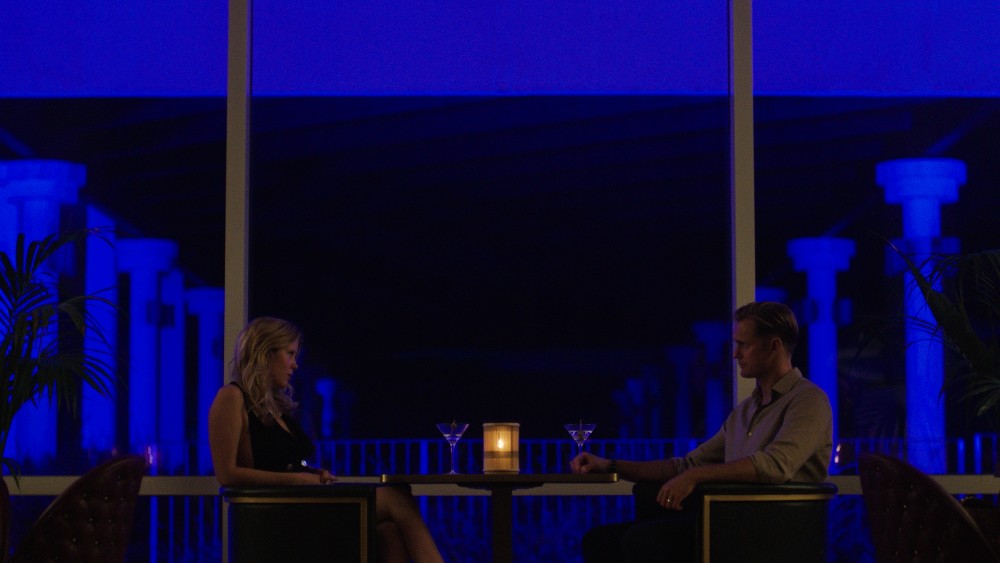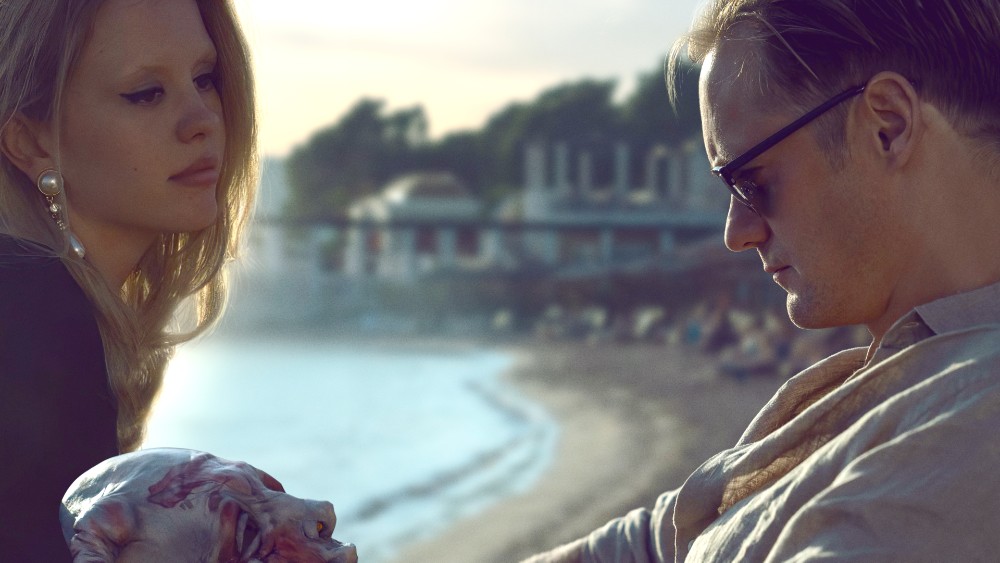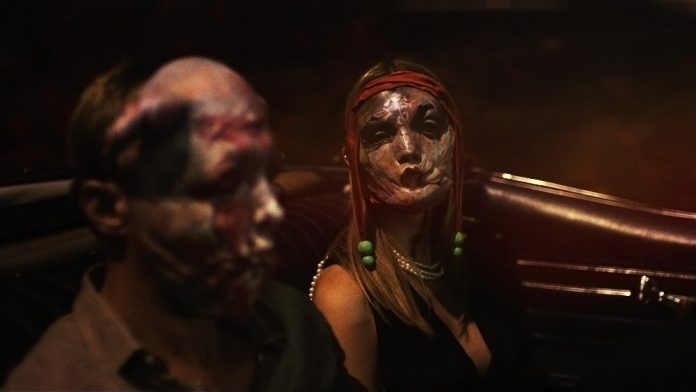Infinity Pool, the third film from director Brandon Cronenberg, is the type of sci-fi thriller that plays better if you don’t know too much about it going in, only because it involves so many bizarre twists and turns that are more effective if you don’t see them coming.
The second-generation filmmaker, whose famous father, David Cronenberg, helped define the extremes to which one could take body horror in the ‘70s and ‘80s, has continued the family tradition — first with Antiviral in 2012 and then with Possessor, which had the misfortune of being released in late 2020 when many movie theaters were still closed due to the pandemic.
Infinity Pool takes the younger Cronenberg’s craft to new places as he offers up his own dark take on rich people on vacation. The film stars Alexander Skarsgård and Cleopatra Coleman (Dopesick) as James and Em Foster, a writer and his wealthy wife, who are vacationing at a remote island resort when they meet Mia Goth’s Gabi and her husband Alban (Jalil Lespert). The two couples decide to go on an adventure outside the resort, a decision that has deadly consequences, as the Fosters soon learn about the region’s tough and unconventional stance on crime.
Above the Line spoke with Brandon Cronenberg over Zoom last week, shortly after the movie premiered at the Sundance Film Festival as part of its Midnight lineup.

Above the Line: How did this come about? I’m sure you’re aware of the slew of recent movies where people go on vacation and bad things happen to them, including shows like The White Lotus, of course. Were you aware of that trend while you were writing, or was it just a coincidence?
Brandon Cronenberg: It’s really just a coincidence. I know there’s this wave of similar themes and settings, as well as The White Lotus, but it takes such a long time to get a film made that you can’t predict these things. This actually started with a short story I was writing back as early as at least 2014, or maybe earlier. Even after I wrote the script, it was a number of years before we could get it financed and made. I actually wrote this before we shot Possessor in that gap between my first two films, so there was no way to really predict the mood of 2023 or the fact that there would be this wave of thematically-related material.
ATL: Possessor was such a phenom, not just because it was an amazing film, but also, it was given a theatrical release during that first year of COVID when not all theaters were open. It must be nice to know that this one will be in theaters for sure this Friday.
Cronenberg: It feels great, even though we’re speaking remotely, to be launching a film in person, and to be at a festival with people again feels great. Possessor was released at a strange time [when] everybody was just kind of feeling out how to put out movies during the pandemic and to what degree that was possible. Because of when Possessor came out, and because my first film was a fairly small film, this is the first time I’ve been able to really enjoy a proper release.
ATL: It’s interesting to hear this started as a short story. Do you have many scripts or stories you have banked for when you’re ready to start a new movie?
Cronenberg: I usually have a few ideas that I’m interested in developing, and then a few projects that are actively in development with some degree of writing [done] and some [of the] process. I realized after my first film that was necessary because when Antiviral came out, I didn’t have anything else in development. I didn’t have a film career at the time, so the process of getting my next film cast and financed was incredibly long.
ATL: Was it really that long between Antiviral and Possessor?
Cronenberg: Yeah, it was eight years.
ATL: Maybe because it played some festivals and then came out later, it didn’t seem like that long.
Cronenberg: Yeah, I made it in 2011. I guess it premiered [in] some places in 2012 and some places in 2013, but it was eight years between shoots.

ATL: Was the title Infinity Pool always part of the original idea? I honestly didn’t know what that was, although I watch many game shows, and infinity pools are often part of the vacation prizes.
Cronenberg: An infinity pool, it’s a pool with a glass edge to it, usually looking at the ocean. If you look at the edge of your swimming pool, it seems like it’s stretching out into the ocean. To me, it’s such a mundane thing, but “infinity pool” as a title ends up taking on this weird meaning in that context, and so that juxtaposition was interesting.
ATL: You’ve been working with Rob Cotterill as your producer since Antiviral. Is part of his role to get you bigger budgets for each progressive movie, or does Infinity Pool just look like it’s more expensive?
Cronenberg: Yeah, I think it’s just the case that financing a film is always going to be a huge risk. You have to convince people that you’re gonna be able to do the work and deliver something [that] isn’t a total disaster. Especially at the start of your career, there’s a ramping-up process that [sees] people hopefully gain some degree of confidence in you.
ATL: How did you approach the casting for this movie? Did you have any specific actors for each role before starting that process? I know Mia had just come off her movies with Ti West, who you might know or might be in similar circles.
Cronenberg: My approach to casting is fairly simplistic and maybe a bit stupid. There are some actors I see who are immediately exciting to me. Whenever they come onscreen, they just sort of sear through the screen, and they have whatever that special thing is that makes them constantly thrilling and compelling. What I want to do is find an actor like that and plug them into a role to inject that life into the character. Obviously, there are some narrative parameters, but I’m mainly looking for actors who are just exciting to me [in] that way, and Alex and Mia are both actors like that.
ATL: What about Cleopatra? What did you see her in that made you think of her for Em? I’d seen her in The Last Man on Earth, but she wasn’t doing this kind of dramatic stuff on that show.
Cronenberg: She did Under the Shadow of the Moon [and] she was really great in that. I had known her also as a comedic actor, but from that, it was obvious that she had multiple, very interesting levels to her as a performer, and [so I] decided to have her on the film.
ATL: I’m always interested in production design, and I had a chance to speak to your father’s long-time production designer Carol Spier last year. How did you find the resort where most of the movie takes place?
Cronenberg: It was half in Budapest and half in Croatia, so the resort was a very strange location that we found in Croatia on the coast. It was actually originally built during communism, and so it has a brutalist architecture as a base. Interestingly, there’s sort of a sister resort with the same architecture that has fallen into total disrepair off the coast. We really wanted to go there, but we never had a chance. There are photos online of it, and it’s this incredible ruin of a resort. This one, however, as I understand it, had been taken over by an eccentric billionaire, who wanted to turn it into a resort where each section of the resort represented a different part of Croatia.
It’s actually even weirder in reality than it is in the film [laughs] because one area is what they refer to as a Dalmatian ethno-village, which is this incredibly intricate old Dalmatian village except totally invented in a sort of Disneyland way. Then, there’s a weird Mediterranean square, which is in the film, and then a pirate ship, and then a sort of sexy swingers club, and then a hotel for children with a giant octopus on it. It’s this incredible collage of strange architecture and aesthetics that we couldn’t completely capture in the film, but we were living there for quite some time, and it was a very bizarre experience.

ATL: I was curious about whether when making a movie at a location like that, everyone just grabs a room and stays there for the entire shoot.
Cronenberg: In this case, yes, we all were staying at the resort. I don’t know how happy they were to have us there, necessarily, because they booked the film during COVID when they didn’t have any guests. By the time we actually shot, it was a very full and active resort, which again, was a very strange experience, especially because living there was mirroring the film in some very dreamlike and alarming ways.
ATL: Did you or someone in your art department create the language of that reason with the symbols and letters? If someone was to pour through this movie very carefully, would they be able to decipher the symbols to figure out actual words, or are they just random symbols?
Cronenberg: We did bring on a linguist who invented the language, so it is a coherent language — the written language and the spoken language.
ATL: I’m a big fan of your DP, Karim Hussain, who has shot some great horror films, including a couple by my friend, Ted Geoghegan, although I’ve never met him, oddly. How do you work with him, even to figure out some of the montages? Do you spend a lot of time in advance storyboarding and making shot lists?
Cronenberg: Yeah, we spent a huge amount of time working on it. We don’t storyboard, but we do shot list. Before we have any cast or locations, when the film is just a script, we sit down early on, and we do a theoretical shot list, not knowing our actual parameters, but just as a way to discuss the language of the film, what kind of lenses we want to use. That helps us wrap our heads around the look and helps Karim figure out what kind of camera package he’s putting together.
In terms of the hallucination sequences, it’s a little bit different, because those are all in-camera practical effects; there’s no CGI involved. It’s really an exploratory process with Karim and also Dan Martin, our Makeup Effects Artist, and Zosia Mackenzie, our Production Designer. Karim and I will experiment with a bunch of materials, certain types of dichroic gel and mirrors and diopters, and certain kinds of lighting for flaring the lens and so on. We’ll figure out some of the tricks that we want to use for those sequences, then we’ll shoot, say, Alex in a mirror box to have this element of repetition. Sometimes, makeup effects will be involved in those sequences, so Dan and Zosia will be involved in creating that initial body of material. Karim and I will shoot some of it through the gels and distort the image live on set to a certain degree, but then we also go through a process of rephotographing where we’ll project the image and just go through it, the two of us, and reshoot through additional filtering and glass to get more of a distorted effect.
ATL: The impression I’ve got from other filmmakers he’s worked with is that he’s a bit of a scientist, almost more than he is a normal cinematographer.
Cronenberg: He’s certainly a great cinematographer. Cinematography is always a combination of art and science because you really have to know how the lighting works and what the math is in terms of light levels, and so on. He is a bit of a mad scientist.
ATL: Are you generally trying to do as much of this stuff practically as possible? I know there are certain safety limitations you have to make for your actors, especially in scenes with cars and such. Otherwise, is most stuff done in-camera?
Cronenberg: Yes, it’s pretty much all practical. There is CGI work done in the film. We had a great VFX artist, Andy Robinson, on it, but it was primarily for things like clean-up [and] removing padding or blood tubes. Sometimes, for a gore effect, you’ll paint out the blood tubes in post and maybe do, like, a little seam clean-up or something here and there, but all the effects are based on practical effects. There’s no CGI blood or completely CGI work done for those effects, and then, the hallucination sequences are entirely practical. There was maybe one shot where we cleaned up some padding on one of the actors [and] painted it out, but across those sequences, it’s all in-camera.

ATL: Neon did something interesting with Possessor by releasing an unrated version, I think theatrically, too. How was it with Infinity Pool? Is it true there was an NC-17 or unrated version that played at Sundance and may also be released later? What’s your relationship with the MPA these days?
Cronenberg: There’s an unrated version and an R-rated version for U.S. theatrical. They’re actually pretty similar, though. Not a lot changed between those two versions. There is some plan in the works in terms of the cut, but I would love people to just go see it in theaters, [as] it is still very much the same movie.
ATL: Do you show up with your film, and the MPA goes, “Oh, this guy again”?
Cronenberg: [laughs] Well, it’s only been twice… maybe the next one.
ATL: I asked before about generally having scripts in development to direct next, so do you already have things in the works or do you have to go through the same process again to get financing? Is it easier with each movie?
Cronenberg: It’s still the same process. I do have some other things in the works. I’m working on developing a limited series adaptation of Super-Cannes, a JG Ballard novel, and I have a space horror film called Dragon that’s in development as well.
ATL: So hopefully we’ll see another movie from you relatively soon?
Cronenberg: Hopefully, it won’t be eight or 10 years, but sometimes it is that [long], I’ve found, so we’ll see.
ATL: I get the impression that you’re generally a filmmaker who believes in showing your movies in theaters, but would you do something for streaming if the opportunity came up?
Cronenberg: With a limited series, I’m assuming streaming is the most likely home. I don’t know where that’s gonna land quite yet, because it’s still in development, but for sure, I like making movies, and I like theatrical, but I’m also curious about [doing a] streaming series.
ATL: How was your Sundance premiere?
Cronenberg: It was great, honestly. The crowd was really lovely. We had a really warm response, and it was wonderful to be there again. We all enjoyed playing 2020 over there and seeing actual human beings and an audience. There was something relieving and healing about being there.
Infinity Pool is now playing in theaters nationwide.



